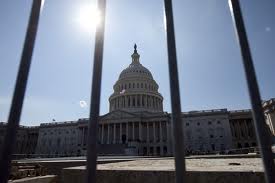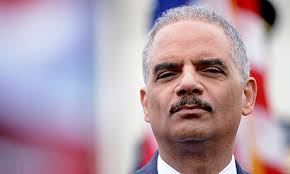
Essay: Harry Reid’s Nuclear Option – Good for the Nominees, but Bad for the Senate
The Senate is tossing and turning. Members are forced to weather the rough, churning waters left in the wake of the newfound battle between Majority Leader Harry Reid (D. – Nev.) and Minority Leader Mitch McConnell (R. – Ky.). The Senate’s inability to pass legislation and refusal to confirm qualified candidates nominated to important government positions and judicial seats has resulted in a public battle between politicians who until recently have always shown respect and deference toward each other. While making interesting reading and watching, it only serves as a distraction. The turmoil only muddies the waters on an important question: Should the Senate change filibuster rules?

Official portrait of United States Senator (R-KY) (Photo credit: Wikipedia)
The relationship between the two has steadily crumbled during recent months. Reid’s recent threat of a “nuclear option” has led to McConnell’s mistrust of his counterpart, believing that he is not going to honor the agreements the two came to in 2011 and 2012 to protect the traditional role of the filibuster. This feeling has recently been exasperated by the Minority Leader’s perception that Reid, and his Super PAC, are trying to influence his re-election in Kentucky. Reid has said he knows nothing about his Super PACS actions nor should he. But the claims, if true, would constitute a breach of the traditional behavior between opposing Senate leaders.
Sen. Reid, meanwhile, is clearly fed up with McConnell’s and the GOP’s refusal to hold confirmation votes on nominees resulting in Ried’s “nuclear” threats and anger at what he sees as McConnell’s refusal to honor a filibuster agreement the two reached early this year. His “vows” to limit the filibuster have boiled over into public combat recently, following McConnell’s warning that Reid would be remembered as the “worst” Senate leader “ever” if filibuster rules were changed by a majority vote.
****
Drowning Out What Matters
Between fighting about confirmations and the filibuster, a lack of trust between the two leaders, and anger over public remarks and re-election involvement, it is little wonder that real discussion about the pros and cons of changing the filibuster have been drowned out.
The filibuster has long been an effective and important tool to protect the minority in government. It can be used to delay legislation and ensure that the views of a small group of senators are heard. Throughout American history, politicians have used it to great effect, and today, the traditional filibuster (as opposed to the silent variety), is an extremely effective way to voice opposition, especially passionate moralistic opposition, to a proposed bill of act.
The filibuster can be an effective tool, able to draw national attention to an issue, boost the recognition of a politician to the national stage, or simply delay an inevitable vote long enough to force additional debate in the public and on the Hill.
Most recently Sen Bernie Sanders (I – Vt.) drew national attention from media and sympathy from voters with his 8 hr. and 37 minutes filibuster of a proposed agreement between a tax cut deal between the President and Republican leadership. Similarly, Senator Rand Paul’s extraordinary 13 hour filibuster, calling attention to the American Government’s use of drones over American soil, brought him strong public support on social media and a resulting bump in national popularity.
But, conversely, the filibuster can cripple Senate action and grind even ordinary measures to a halt. Washington has been inculcated by this type of problem, with “silent holds” acting as filibusters in the absence of cloture. Famously, judicial seats are left unfilled (as of April, the NY Times was reporting that 10% of federal district and circuit court seats were empty) and no bill, no matter how seemingly uncontentious, can pass without a supermajority.
But what is the right thing to do? Should Sen. Harry Reid force through a change in the rules, or should the Senate try to amend the use of the filibuster without going so far as to kill it all together with a simple majority vote? The repercussions of such a “nuclear option” are vast, subtle and difficult.
****
The Nuclear Option: Danger, Danger Will Robinson!
Harry Reid’s “nuclear option” is dangerously extreme. As explained by Jonathan Weissman and Jeremy Peters of the NYTimes, “the majority leader, through a simple majority vote, would put new limits on the minority party’s ability to filibuster presidential nominees. Ordinarily changes to the rules of the Senate require a two-thirds majority; Democrats hold 54 seats.”
This option cannot be taken lightly as it may destroy many of the differences between the House and Senate, could undermine protection of the minority (regardless of party) and throw an important, oft-used traditional political tool into the trash heap.
It certainly is true that the Senate needs to vote on appointees to the various seats and positions that have for so long gone unfilled. It certainly is true that the filibuster has been misused over the last three presidential terms. But the misbehavior has not been saved for one party, faction or group of politicians. Democrats and Republicans alike have used the filibuster to their benefit, stalling and in some cases stopping bills disliked by the minority.
Aside from removing the ability of many lesser known or less powerful Senators a chance to voice exactly why they will not allow a nomination, scrapping the current filibuster system risks compromising the Senate on a fundamental level. Trashing this old tradition would obfuscate some of the uniqueness that makes the Senate the body we know today. Removing this system, especially in a “nuclear option” Harry Reid led manner, risks removing the trust and compromising nature of the Senate, making it simply another version of the House of Representatives. Senator Harry Reid cannot let that happen.
Washington, by all accounts, is broken. Legislation, regardless of how popular is rarely passed. Laws, regardless of how needed, are rarely written. Confirmations, regardless of how qualified the candidate, rarely take place. But, the Senate still manages to occasionally do it’s job, find compromise and attempt to govern the nation. By pushing through his nuclear option, Reid risks alienating both traditionalists, politicos and the Minority party, risking the very culture that makes the Senate more effective than the House.
****
Majority Leader Reid is right to be unhappy, annoyed and furious with the GOP and Minority Leader McConnell. Their actions recently, especially regarding confirmations, have been obstructionist to say the least. But by pushing through a “nuclear option” Sen. Reid will likely gain the 7 confirmations he is angling for at the expense of the Senate’s culture, future credibility and the likelihood of future legislating. The Senate, in today’s Washington climate, has been a truly unique body, able to fail to find compromise most of the time, not all the time.
Harry Reid would do well to remember that the long term future of the Senate is more important than the short term prospects of Obama’s nominations. Rather than resorting to such a drastic rules change, Leader Reid should look to find a way to amend the current system. Maybe there is a way to make the “silent hold” practice truly impossible. In 2012, Democratic Senators signed a petition to agree to stop silent holds and filibusters, but it is time for this to be truly impossible. This would force Senators to publicly acknowledge their actions. Maybe there is a way to, with a simple majority, allow a confirmation process to start, but allow filibusters to take place during that process. This would allow the public to hear why a particular Senator doesn’t want an individual to gain a particular position, rather than hide behind the leadership and prevent the process from beginning at all.
If Senator Reid he uses a “nuclear option,” he will risk selling the farm to save his corn. The Senate would likely confirm important nominees, but would be crippled, robbed of a traditional process and a unique culture of compromise.
Filed under: D.C Playground, Essays, Uncategorized | Tagged: Filibuster, Harry Reid, Judicial Appointment, McConnell, Mitch McConnell, Nuclear Option, Rand Paul, Reid, Republican, Senate, Senate Confirmation, Senate Rules | 1 Comment »
 Rather than celebrate a debt limit victory over Republicans, President Obama and the rest of the party are ducking for cover, as Republicans and the public fume over what is seen as government ineptitude with HealthCare.gov and Americans losing their coverage. While democrats in Congress were willing to swallow a difficult pill when passing the A.C.A in 2010, they may be less willing to stand by the law now. Already, democrats are introducing new legislation to amend or delay Obamacare. Soon, the Obama administration will not only have given back all the ground gained after the government shutdown, they will be trying to lead a party unwilling to follow them.
Rather than celebrate a debt limit victory over Republicans, President Obama and the rest of the party are ducking for cover, as Republicans and the public fume over what is seen as government ineptitude with HealthCare.gov and Americans losing their coverage. While democrats in Congress were willing to swallow a difficult pill when passing the A.C.A in 2010, they may be less willing to stand by the law now. Already, democrats are introducing new legislation to amend or delay Obamacare. Soon, the Obama administration will not only have given back all the ground gained after the government shutdown, they will be trying to lead a party unwilling to follow them.




















































